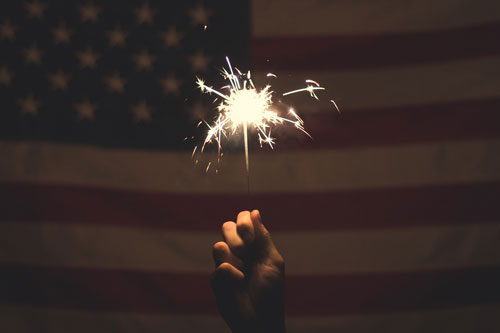The Fourth Of Why
Why is America’s Independence Day celebrated on July 4, despite strong evidence the independence took place on a different day?
Hey guys, Ernie here with another piece from Andrew Egan that ponders the details of American independence. Why do we celebrate it exactly this way? I’ll let him take it away.
Sponsored By … You?
If you find weird or unusual topics like this super-fascinating, the best way to tell us is to give us a nod on Ko-Fi. It helps ensure that we can keep this machine moving, support outside writers, and bring on the tools to support our writing. (Also it’s heartening when someone chips in.)
July 2nd
The day John Adams predicted Americans would celebrate as their Independence Day. “The Second Day of July 1776, will be the most memorable Epocha, in the History of America,” he wrote in a letter to his wife Abigail. “I am apt to believe that it will be celebrated, by succeeding Generations, as the great anniversary Festival.” Adams was wrong, of course—despite the vote to declare independence taking place on July 2, 1776, July 4 gets most of the notice instead. The Fourth of July would come to have extreme significance to Adams late in life.

(Free-Photos/Pixabay)
When a country declares its independence day says a lot about the country
History is rarely clean. When does a country celebrate its independence? It’s a relatively minor but important question in political science.
(One thing we know for sure is that July is popular month for independence. The first week of July is especially popular with 12 countries celebrating their independence from July 1st to 7th. Among the countries, besides the U.S., that count themselves as early July babies: Algeria, Belarus, Burundi, Canada, Cape Verde, Comoros, Malawi, Rwanda, the Solomon Islands, Somalia, and Venezuela.)
Beyond the time of year, the timing of the independence celebration matters as well. For example, Morocco, America’s oldest ally, celebrates its Independence Day on November 18th, even though it was proclaimed independent on March 2nd, 1955. The 18th is celebrated to commemorate the ascension of King Mohammed V to the throne of Morocco.
“Today we celebrate the Feast of the Throne that links us to our glorious past and the most brilliant epochs of our civilization,” the king stated during a celebration held that day. “Thus these three national festivals recall for us memories of glory, victory, rebirth and liberty.”
Why a nation celebrates their independence on a particular day establishes helps establish the priorities of a nation. Morocco is a constitutional democracy that grants far-reaching powers to the monarch. It makes sense that their Independence Day would celebrate their king as their foundation of their government.
So what does it say about America that we celebrate our independence on the Fourth of July?
three
The number of American presidents that have died on the Fourth of July. In fact, it is the deadliest day to be a former American president. More presidents have died on July 4th than any other day in the calendar year. With only 45 presidents (with six still living), it seems strange that any two presidents should die on the same day, let alone three. Thomas Jefferson and John Adams would famously day on the same July 4th in 1826. Another founding father and president, James Monroe, would follow in 1831.

Fireworks. (Mike Mozart/Flickr)
Celebrating American independence started out pretty informally
Around the world, people celebrate the Fourth of July. It’s not just limited to the spectacular number of American military bases around the world, which numbered 800 bases in 70 countries in 2015. Tourism boards in Denmark and Canada arrange celebrations for American tourists that happen to be in their countries at the time. Which is strange since there is no singularly recognized American independence day.
For the first 90 years of American history, various communities and municipalities celebrated July 4th as the country’s Independence Day. The first started in 1777 when Philadelphia celebrated July 4th with “joy and festivity”. It just wasn’t official.
When the United States finally declared July 4th as a holiday for federal employees in 1870, the executive branch decided it should be unpaid. Americans celebrated anyway, like they had for the previous 93 years. They celebrated the way they always had, with guns and speeches from politicians, with fireworks and booze and various pot luck dinners.
Today, the Fourth of July is still pretty informal. Non-essential federal employees have had a paid day off on every July 4th since 1941. But the United States is a federalist democracy with various levels of representation. The states have rights and many of them never got around to making July 4th as America’s official Independence Day. They took it as a given and moved on to governing. Employees of America’s 50 states aren’t officially granted the day off on July 4th. No legislation (I’ve found) guarantees July 4th as a paid day for government employees. It’s just sort of recognized as a given for members of government. In New York State, non-essential employees get a paid vacation day.
But the Metropolitan Transit Authority (MTA, i.e. the branch that runs NYC subways and buses) still operates, and it’s a coveted day to work. When I asked an MTA employee riding an A train about working on the 4th, he hoped he’d get the chance. “It’s good overtime,” he said.
There’s nothing more American.
“The U.S. Constitution is the nation’s fundamental law. It codifies the core values of the people. Courts have the responsibility to interpret the Constitution’s meaning, as well as the meaning of any laws passed by Congress.”
— This statement on the website of the Administrative Offices of the U.S. Courts details the foundation of American jurisprudence. America is a nation of laws. It’s up our elected representatives to decide what laws to enact and it’s left to the courts to interpret how they’re enacted. It’s not a great system but it relies on all of us, not just some of us.
The U.S. Constitution was ratified on December 7th, 1787. America’s first patriots repelled the British military on April 7th, 1777 at Lexington and Concord. On September 3rd, 1783, British and American diplomats (our side lead by our dear friend John Adams) signed the Treaty of Paris, where Great Britain recognized the American colonies as a sovereign nation.
From Philadelphia and Valley Forge to Yorktown and Paris, the cause for American independence had many important days. The one that would become most important, July 4th, 1776, was the day the still unrecognized Continental Congress ratified the text of the Declaration of Independence. The document was intended to have the rule of law in the colonies as representatives had agreed to it. Signatures weren’t necessary but the the president of the Congress made sure his signature was apparent. (If you’re ever asked for your John Hancock in the U.S., now you know why.)
The Declaration of Independence was the first governing document issued by what would become America’s legislative body. That may sound like a boring line from a history textbook, but it’s unbelievably important.
America is a nation of laws. We may not always agree with those laws, but that’s why we get to vote. When the American government issues a document that has the force of law, it also has the power to implement it. The same was true of the Declaration of Independence, a governing document made real by the American people.
America honors its Independence Day to celebrate the moment a group of lawyers, soldiers, and entrepreneurs came together to create something new and great. It was just an idea. One that in 1776 could have easily been snuffed out. Instead, a group of farmers, field hands, and skilled technicians coordinated with the “elite” to figure out how to be free. They worked together to get their share of something better.
And 250 years later, that’s why we eat burgers, drink beer, and bask in the sun on the Fourth of July.
:format(jpeg)/2018/07/tedium070318-compressor.gif)
/2018/07/tedium070318-compressor.gif)


/uploads/andrew_egan.jpg)